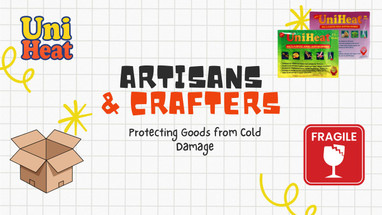Posted by UniHeat Shipping Warmer Experts on 4th Nov 2025
Artisans & Crafters: Protecting Goods from Cold Damage
Handmade doesn’t mean fragile—but cold can make it that way. If you ship handmade candles, soaps, cosmetics, paints, or resin crafts, low temperatures can alter appearance, texture, or performance. This guide shows how to protect your products from freezing and temperature shock using UniHeat shipping warmers, insulation, and smart winter packaging strategies.
1) How Cold Damages Handmade Goods
Even short-term cold exposure can cause irreversible changes in handmade items. Many artisan products contain oils, waxes, or water-based emulsions that solidify or separate when chilled below 50°F.
- Candles & wax melts: Can crack, discolor, or frost when cooling too fast in transit.
- Lotions & balms: Separate or grain when fatty acids crystallize in cold air.
- Soaps: Sweat or warp due to temperature swings during delivery.
- Resin art & paint kits: Resin thickens or becomes cloudy; pigments separate in extreme cold.
Pro Tip: Even short doorstep exposure can cause damage—train customers to bring boxes indoors immediately upon delivery.
2) Why UniHeat Warmers Work for Artisan Products
Originally designed for live animals and plants, UniHeat warmers offer low, oxygen-controlled heat that stabilizes box temperature without overheating. They’re non-toxic, self-regulating, and safe for delicate materials—perfect for preventing freeze-related cracks, condensation, and oil separation.
Unlike hand warmers, which spike above 130°F, UniHeat maintains a gentle, consistent heat output (around 100°F peak) over 40–96 hours, depending on the pack type.
- 40-Hour UniHeat Pack — Great for 1–2 day shipments of small goods.
- 72-Hour UniHeat Pack — Ideal for cross-country or 2–3 day deliveries.
- 96-Hour UniHeat Pack — For extended transit or colder climates.
3) How to Build a Winter-Proof Package
Protecting handmade goods doesn’t require expensive materials—just the right layering:
- Inner wrap: Use paper or bubble wrap to buffer temperature swings around each item.
- Insulated liner: Add a foam or reflective liner inside your shipping box to retain warmth.
- Heat source: Tape a UniHeat warmer to the lid or side of the box, with a small cardboard spacer for airflow.
- Vent holes: Punch 2–4 pencil-sized holes in the outer box only—this allows oxygen to keep the warmer active.
This combination prevents sharp temperature drops while keeping the internal microclimate safe for sensitive materials.
Pro Tip: Always pre-activate the warmer 20–30 minutes before sealing the box. It should feel warm, not hot, when packed.
4) Labeling and Customer Education
Cold-weather labeling isn’t just for logistics—it reassures customers that you’ve taken extra care. Include the following:
- “Temperature Sensitive – Protect from Cold” on all boxes.
- Include an insert card: “Allow your handmade products to rest indoors for 24 hours before opening.”
- Add care tips to your winter product listings or thank-you cards.
These simple steps minimize complaints and damaged returns while building trust with buyers.
5) Recommended Winter Practices for Makers
- Batch-insulate multiple small orders together in one box for better heat retention.
- Delay shipment if temps drop below 20°F for several days in transit areas.
- Offer optional “Cold-Weather Protection” add-ons at checkout to cover materials and warmer cost.
- Keep inventory and finished stock in stable indoor temperatures before packaging.
Frequently Asked Questions
Can UniHeat warmers damage wax or cosmetics?
No. UniHeat produces mild, consistent warmth—not direct heat—so it won’t melt or distort finished products when properly spaced.
How many warmers do I need for one small shipment?
Usually one 40-Hour pack per small box (up to 1 cubic ft) is sufficient. For larger multi-item boxes, use a 72-Hour warmer for even distribution.
Will adding more insulation make my shipment safer?
Only to a point. Over-insulating reduces airflow, which can choke the warmer and shorten its lifespan. Leave a small internal air gap.
Can I use leftover UniHeat packs from last winter?
If unopened and stored in a cool, dry place, yes. If packaging shows moisture or damage, replace with fresh warmers for full performance.
Are UniHeat warmers environmentally friendly?
Yes. UniHeat warmers are biodegradable and non-toxic, made from iron powder, water, and vermiculite—safe to dispose of in household waste.
Summary: For artisans and crafters, cold weather doesn’t have to mean ruined inventory. With the right insulation, ventilation, and UniHeat warmers, your handmade creations can arrive as perfect as when they left your studio. Explore 40hr, 72hr, and 96hr heat packs at UniHeat.us.

